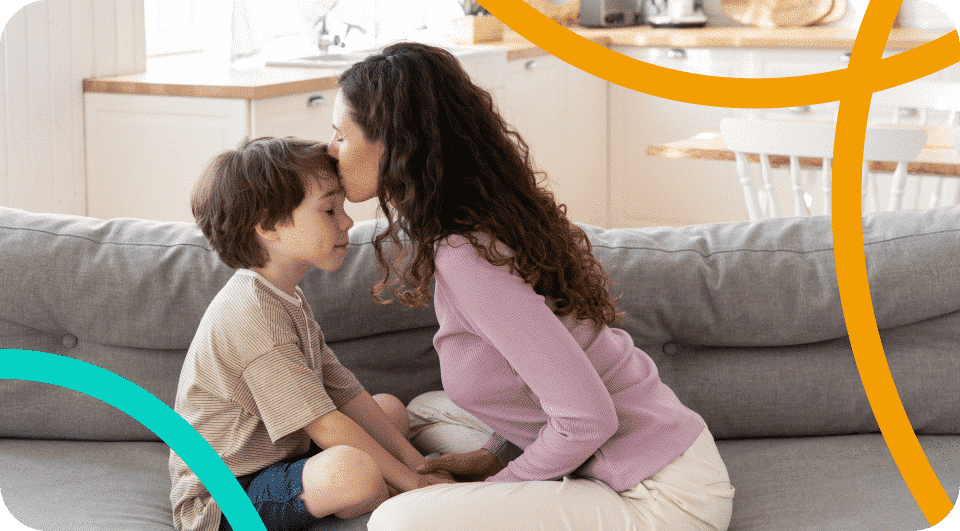Attend our online Event and learn how to stop yelling at your kids and also communicate your expectations. Start approaching conflicts with a problem-solving mindset rather than focusing on punishment or negative consequences.
Discover how to be patient with your kids and not turn every interaction into a power struggle with 3 effective methods on how to handle tantrums and constant refusals.
Understand how to communicate your expectations without yelling at kids, nagging, or repeatedly reminding them what they have to do.
Learn how to get kids to brush their teeth, eat vegetables and even motivate your child to do homework, all from a sense of responsibility and inner drive.
Gain insights into the psychological effects of yelling at kids and discover effective anger management techniques for parents

You’re at the park with your son or daughter. Suddenly, you hear two angry parents yelling at their child. The child is not crying but looks like he has turned to stone. As a spectator, you recall witnessing a similar reaction in your child.
However, when you yell at your child, there’s always a valid reason behind it. You certainly don’t resemble those parents, do you?
It is easier to observe parent-child interactions when we are not the ones experiencing them. At times, we tend to take an extreme position, thinking we could do significantly better or worse than other parents.
There are moments when you have no patience with your children, while other times, you feel like everything they do is normal because they’re just kids. This gets children confused since they have no idea why mom is screaming or dad gets angry in one instance but not in other similar situations.
What if you had a team of experts who understood your concerns? What if this team was ready to invest the time and energy to dig into the most recent scientific research on how to raise children to help them reach their full potential, without the need for shouting, bribing, or punishing? And what if all these complex pieces of scientific information were brought to you in an easy-to-understand, easy-to-follow plan?
Striving for perfection when disciplining a child can be unhealthy for both parents and children. Children need to see that their parents are human, with a large range of emotions, failures, and breakthroughs, just like everyone else.
When parents make mistakes, it’s an opportunity to model healthy ways of coping, apologizing, and problem-solving. A parent’s words matter greatly to a child and can impact their self-esteem and well-being.
Yelling at kids is a short-lived method that can lead to negative outcomes, such as an increased risk of anxiety and depression. Instead, parents can model positive and respectful communication to create a supportive and healthy family environment.
The truth is that trying to get children’s attention and cooperation is a challenge to many parents. That is exactly why it often results in fights and arguments. We feel like we’re losing our control over them and that they no longer recognize our authority.
Most of us were taught that parenting has a hierarchical structure where children must listen to their parents. However, research shows that we should see our children as partners in learning to help us become better people in general, not only as parents.
Patrick Ney is an author and Lead Trainer at All About Parenting, a global parenting organization active in more than thirty countries around the world. An inspiring speaker who has featured at Tedx, he has led hundreds of workshops, seminars and meetings for more than a hundred thousand parents worldwide. His first book, “When At the Zoo Watch the Humans” was a No. 1 Amazon Best Seller and he’s just released his first book for children, “What Do Humans Taste Like?” a fun book designed to help children develop theory of mind thinking.
Feeling overwhelmed can make it difficult for parents to create a suitable environment for effective parenting. Consequently, resorting to harsh forms of discipline, such as yelling at kids, may seem like a convenient solution due to its immediate impact. However, is yelling harmful? Unfortunately, studies show that raising your voice can have detrimental effects on children’s emotional and psychological well-being:
Children between 2 and 5 are constantly developing and learning. Their actions are the result of their cognitive and emotional development. This means their brains are in the process of adapting to the environment. Try not to take their behavior as a personal attack. Try to approach the situation with empathy and not lose your patience.
Furthermore, taking time for yourself and engaging in self-care and stress management techniques, such as exercise, and meditation, can help you manage your emotions better. By remaining calm, you can approach parenting with a clear head and a composed demeanor.
To conclude, if you are wondering how to stop yelling at your kids, try to develop discipline strategies and avoid shouting. Pay attention to your children’s emotional needs and development, in order to ensure optimal emotional and psychological well-being.
If you feel you need more help on this topic our friendly virtual assistant Sophie can give you more information.
Research indicates that children can be sensitive to the tone and intensity of parents’ voices. This can have a lasting impact on their emotional and psychological well-being.
Children who regularly experience being yelled at are more likely to develop emotional and behavioral problems, such as aggression, anxiety, depression, and low self-esteem.
If you’re wondering, “Will my kids remember me yelling?” know that the negative effects that ensue can last well into adolescence and adulthood. This makes it essential for parents to understand the potential consequences of yelling at their children and take proactive steps to prevent it.
To fend off long-term negative effects, parents can develop alternative disciplinary strategies:
In conclusion, the long-term effects of yelling at kids might differ from child to child. Parents need to understand that an aggressive approach such as yelling comes with negative consequences on the emotional and psychological well-being of the child.
Children may exhibit challenging behavior such as tantrums, defiance, and dismissive attitudes while they are still learning to navigate the world and regulate their emotions. Accept that feeling frustrated or overwhelmed does not make you a bad parent. However, it is essential to avoid directing these frustrations toward your child through yelling or other forms of harsh discipline.
Disciplining your child by yelling can have several adverse psychological effects. They may experience fear and anxiety, both about the situation that led to the yelling, and their future interactions with the parent or other authority figures.
This fear and anxiety can lead to difficulty sleeping, nightmares, or panic attacks. Instead, what you can do is develop effective discipline strategies that focus on positive reinforcement and communication. You can do this by setting clear and consistent boundaries and giving recognition to your child when she meets expectations.
Moreover, frequent yelling can significantly undermine a child’s self-esteem and sense of self-worth. The child may begin to internalize the negative messages conveyed through yelling and start to believe that she is “bad” or “worthless.”
Consequently, this can lead to low self-esteem, social withdrawal, and difficulty in building healthy relationships with others. Using effective communication, such as active listening and empathy, can help build a stronger bond with your daughter and ensure healthy emotional growth.
In conclusion, make your child’s emotional well-being a top priority. Our Events where our experts talk about parenting can provide valuable information and support to develop effective strategies and improve your family’s overall well-being.
Yelling is a common approach parents use to discipline their children. Nevertheless, yelling can be harmful to children. There are alternative approaches that can be used to learn how not to yell at your kids and teach them how to behave and how to develop self-discipline:
Take a break if you feel you are losing your calm. This can involve taking a few deep breaths, or stepping away from the situation altogether. By taking a break and regaining your composure, you can approach your child with a calm and collected attitude.
Realizing that it’s necessary to change your behavior and make an effort to improve your relationship with your teenager is a great first step. Losing temper with child can influence his emotional and cognitive development, as well as behavior.
“How to stop losing my temper with my child” – Be patient with your child and appreciate the effort because it takes time and determination. For instance, if you’re trying to stop yelling at your teenager during arguments, you could celebrate a positive interaction after calmly discussing a disagreement with them. This could mean acknowledging and praising both yourself and your teenager, for staying calm and respectful during the conversation.
It’s important to celebrate the little wins. They can help build confidence and motivation toward developing healthier communication habits.
I loved the class. You taught me how to be more patient with my kids and opened my eyes to my mistakes. I always prided myself on having obedient children, even when I had to yell at them to get them to listen. Yelling always worked so why change it? I even argued with my sister about being too permissive with her kids. I envisioned my kids in 20 years, wanting nothing to do with me, and telling me how my yelling affected their self-esteem and relationships. I didn’t see anything wrong with what I was doing because I was not hitting my kids like my parents did to me. Not in a million years did I ever think yelling is just as damaging. I’m ready to change for them.
I did not know that parents’ yelling severely affects children. My 3-year-old is difficult every day. I felt almost justified as his parent to raise my voice. My parents did, and all the adults I know discipline their children by yelling. We never think about the long-term effects, especially when we see them playing and giggling like nothing happened. The phrase “children live in the present and do not see you as a bad mother even if you yell, but internalize feelings of regret, guilt and shame” still echoes in my head.
Discovering the masterclass on shouting was a pivotal moment for me as a parent. It made me realize that I had unresolved problems and that I am a parent with anger issues. I realized that I needed anger management skills for parents because my issues were affecting my family.As a result, I decided to invest in the program and, from that point on, things began to improve. The program provided me with valuable tools and insights to address and manage my anger in a healthier way. I am grateful for the positive changes it has brought to my family dynamics and for the opportunity to become a more patient and understanding parent.
You are so right. I yelled at my toddler and scared him. I wouldn’t recognize myself if I looked in the mirror when I yelled at my kid. I did not even think about it until I saw the picture of the woman screaming and how scary she looked. That really hit home. How scary I must look to my kid when I scream at the top of my lungs. You’ve given me a rude awakening because now I can picture all the damage I do. Thank you for all the good you do and all the parents you help!
Not yet a mother, four months to go. But, I listened to every word, especially when it came to the development of the baby’s brain. So interesting and well-documented. My baby’s father has some anger issues. Next time, we will both watch. Thank you so much for these invaluable classes. I’m sure they are a great help to many parents.
“The lady said not to yell at me, mommy!”. That’s what my daughter said to me the other day after watching the master class with me. I keep forgetting how smart she is, and sometimes she amazes me with the things she comes up with. I wish she didn’t have to remind me, but she does and it helps me think about why parents overreact. We shouldn’t take our stress out on our kids. Sometimes I feel like she is more mature than I am and that is not fair to her because I am the parent.
Question… Will my toddler remember me shouting? I’m a mother of 5. My patience is not what it used to be. The way you talked about brain development and that yelling harms our children made me feel very guilty. I look at my big kids, and I know they’re used to having an angry mom. We even laugh about it. But this doesn’t feel like a joke anymore. I want to improve our family environment and make sure the little one doesn’t witness the chaos. Very eye-opening. We will bring this topic into our family meetings. The work you and your team do is so important. I wish you the best of luck!
Discovering the effects of angry parents on children was a profound realization for me as a mother. It was through the All About Parenting program that I gained this invaluable knowledge. I was amazed by the program’s exceptional quality and the wealth of information it provided. The insights and understanding I gained have transformed the way I parent. I am grateful to All About Parenting for shedding light on this crucial topic and equipping me with the tools to create a nurturing and loving environment for my children.
I do it unconsciously. During this presentation alone, I yelled at my children more than five times. I’m trying to learn how to be a better parent, and at the same time, I’m doing just the opposite. They are so loud. And what do I do to stop them? I yell even louder. I’m going to try all these methods because they make a lot of sense. I am still amazed at how simple and natural you make it sound. I believe that stress gets the best of us, but if we don’t do something about our anger, it could backfire when our kids are older.
My child has anger issues. It’s scary to think that my daughter doesn’t know how to express herself without yelling because of me. When she was little, I struggled with my own anger. I was in an abusive relationship and instead of seeking external support I took my anger out on her. I will recommend the program to other parents. Maybe they won’t make the same mistakes I did. When my daughter was born, these resources were not available to us, and now I need to rebuild the trust and communication to get our relationship back on track. Better late than never, as you said. Thank you!
My 6-year-old daughter told me she needed a vacation from me. This was her way of telling me that I was stressing her out. I don’t want to think that I am stressing my daughter out and possibly harming her. Instead of being a safe place for her, I’m damaging my child. My daughter deserves a calm dad, that is loving and supportive. We need more classes like this to remind us of the great responsibility we have as parents.
After attending a live event hosted by All About Parenting, I found myself deeply moved and inspired. Growing up with parents yelling constantly, I carried the weight of that trauma with me. But as I plan to have a baby of my own, I am determined to break the cycle and create a different, loving environment.All About Parenting has become my beacon of hope. Their program has given me the tools, knowledge, and confidence to become the parent I aspire to be. The strategies and insights shared have touched my heart, providing a path toward nurturing communication and understanding with my future child.
Thank you, All About Parenting, for guiding me on this transformative journey. With your support, I am confident that I can break free from the past and provide my future child with the love and care they deserve.
Everyone sees my child as the best behaved boy in school and everywhere else he goes. He never gets into conflicts and even tries to mediate between his classmates. I am a bully and I am sure he wonders why is mom always mad at me. I am a single mom and I think I am subconsciously trying to get him to be a man, the man his dad never was. I yell at him and tell him it’s his fault he makes me mad. I wish I could take it all away. He is 13 now so I hope I can show him how sorry I am and help him rebuild his self esteem. Thank you for making me realize that I’m the problem.
I used to feel guilty for getting angry with my baby. It was a constant struggle, and I knew I had to make a change. That’s when I discovered this incredible program. Investing in it was a turning point for me. With the help of the program, I learned how to improve my temper and break free from the habit of shouting. The guilt slowly faded away as I implemented the techniques and strategies taught in the program. I am grateful for the program’s guidance and support in helping me become a more patient and loving mother to my baby.




Thank you for subscribing to our newsletter.
You will start receiving our newsletter.